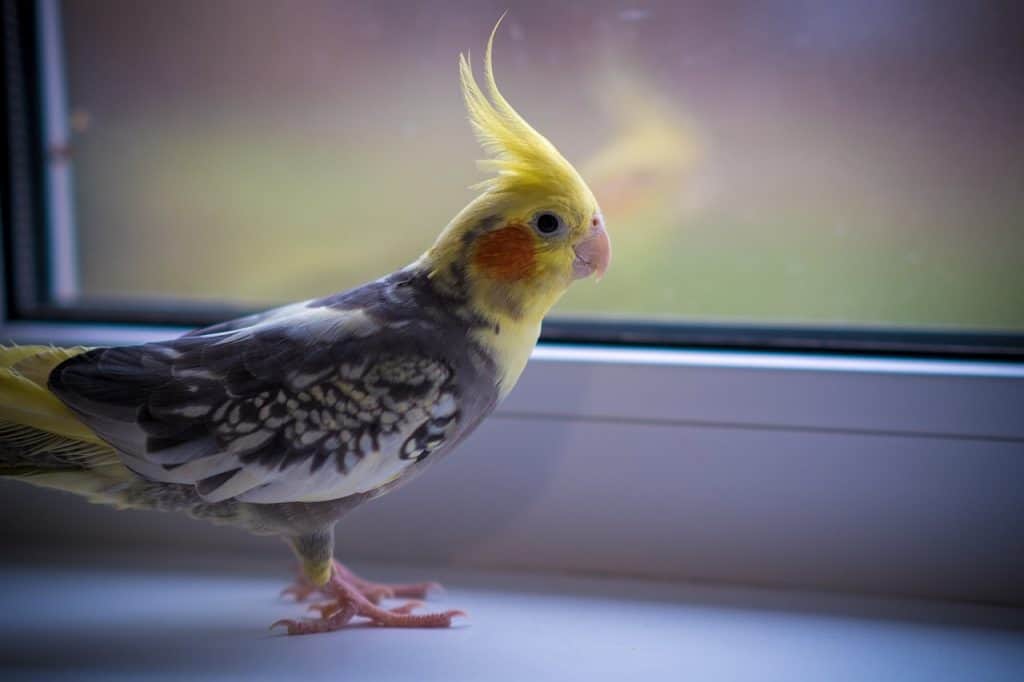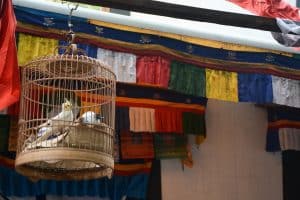So, you’re wondering, are cockatiels good for apartments? This is a question many potential pet bird owners grapple with, especially when living in small or shared spaces. Cockatiels, beloved for their lively personalities and beautiful plumage, are indeed a popular choice among pet bird enthusiasts, and for good reason. Leading a quiet lifestyle, cockatiels can be a fitting choice for apartment dwellers.
In comparison to other members of the parrot family, cockatiels are smaller birds, making them less demanding in terms of space. Unlike larger parrot species, like the vocally expressive Amazon parrots or the robust African Greys, cockatiels demand a relatively modest bird’s cage. This is beneficial if your apartment space is limited. Plus, compared to other birds of similar size, such as Pionus parrots or Senegal parrots, cockatiels are known to be less vociferous.
Cockatiels are also notably social birds, seeking regular interaction and mental stimulation from their owners. This character trait makes the breed a wonderful choice for pet owners who enjoy spending quality time with their feathered friends. However, keep in mind that a spot close to the action can also lead to more noise, so it’s important to ensure that your bird’s cage is positioned in an area that doesn’t disturb neighbors or other pets. Overall, with the right care and attention, cockatiels can make excellent pets, even for those living in apartments.
Understanding Cockatiels: A Brief Overview
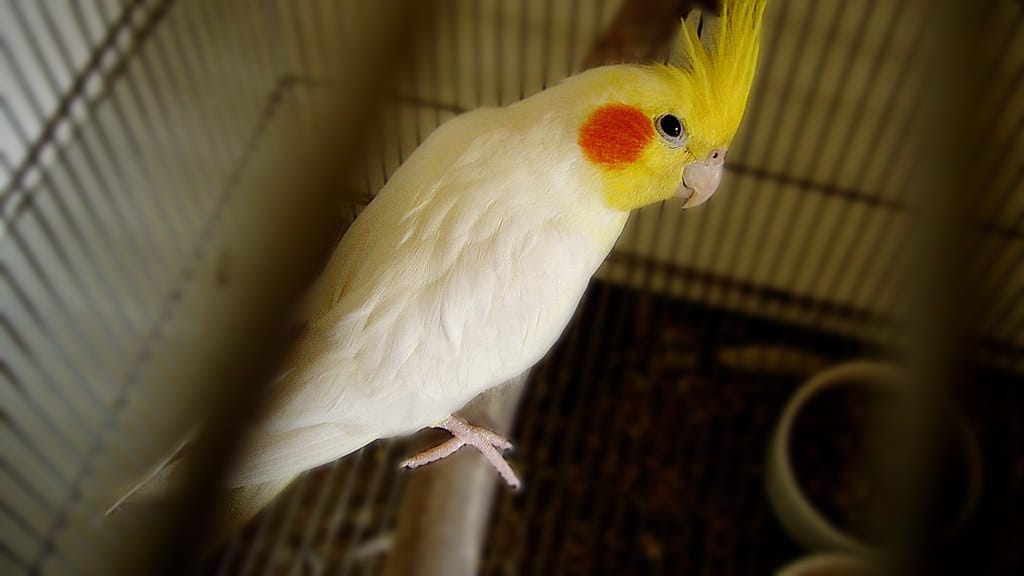
The moment you welcome a cockatiel into your apartment, you’re signing up for a loyal and entertaining feathered friend. Originating from Australia, cockatiels are part of the parrot family and are indeed great pets. Whether you’re exploring pet birds for the first time or you’re an experienced bird owner, cockatiels can make ideal apartment pets, thanks to their endearing personalities and manageable size.
Cockatiels are relatively small birds, which makes them suitable for apartment dwellers with limited space. Compared to larger bird species like the African grey or Amazon parrots, cockatiels require a smaller cage, easing the burden of space. However, their cage size should still enable them to stretch and flutter around comfortably. Experts suggest a minimum cage size of 24″x18″x24″. A pet bird can’t stay inside the bird’s cage at all times. They also require regular out of cage time for exercise and mental stimulation.
In comparison to other birds such as the vocal parrot species, Senegal parrots, and Pionus parrots, cockatiels are quieter birds. While they do exercise their vocal cords with chirps and whistle tunes, they tend not to make a lot of noise. It’s worth noting that male cockatiels might be more vocal, given they mimic sounds and songs to woo their female counterparts. With their melodious voice, they can cheer up any apartment living context without unnecessary high-pitched sounds that might disturb neighbors in the apartment complex.
Still, it’s essential for pet owners to remember that like any other pet, cockatiels require dedicated care. This includes a balanced diet, veterinary care, social interaction, and a clean, safe environment. The natural curiosity that makes these birds such beautiful companions also means that your cockatiel would be safer in the cage at night, to protect them from possible night frights.
However, if you’re weighing the options to choose between cockatiels and other birds like larger species or playful birds such as mini macaws or Meyer’s parrots, keep in mind every pet comes with its own set of requirements and quirks. Interestingly, apartment dwellers also find the quieter bird species like the blue-headed pionus, Senegal parrots, and Bourke’s parakeets to be pretty quiet and friendly birds, ideal for small spaces.
Cockatiels carry an impressive lifespan of 15-20 years in captivity, which means if you’re considering adding one to your family, be ready to love and care for these sweet, social birds for many joyful years to come. And if you’re prepared to do so, owning a cockatiel can be one of the most rewarding experiences you’ll ever have as a pet owner. To truly understand these birds, consider spending time with one: you might be surprised at how quickly these adorable birds can warm their way into your heart!
- STURDY METAL CONSTRUCTION: Constructed of quality wrought steel coated with rust-and water-resistant hammered paint, this divided breeder cage boasts excellent strength and durability, which is ready for your birds to use for years to come.
- FLEXIBLE BREEDING CAGE: The dividing grate helps divide this wide bird cage into two individual breeding/living spaces for housing two or more birds. Each bird cage system contains 2 perches, 2 feeders, a lockable door, a side nesting door, a pull-out tray and a grate. Or you can remove the middle grate to make it a bigger cage.
- STACKABLE FOR MORE VERSATILITY: Got many birds but had limited space to keep them? This stackable breeding cage is your best solution. You can pile up two or three cages together to efficiently leverage the vertical space in the room and save space.
- PET-PARENT FRIENDLY: Four perches and four plastic cups are included for your convenience. The cage has 4 feeding doors on the face for easy seed and water refilling.
- EASY CLEANING: With the waterproof finished cage and the bottom slide-out tray, cleaning for this cage would be a breeze for pet parents. The pull-out grate at the bottom prevents birds from walking in its excrement.
Noise Levels: Are Cockatiels Apartment-Friendly?
When you’re considering a pet bird for small spaces, it can be tough deciding on the species that suits your apartment living best. Are cockatiels good for apartments? Let’s dive in.
Cockatiels, part of the parrot family, are generally known to be quieter than most parrot species like Senegal Parrots or Amazon Parrots. Unlike their larger bird brethren, they are small birds that don’t tend to make a lot of noise. They’re not completely silent but their sounds are often light and chirpy rather than loud and piercing. If you’ve ever had an African Grey or a Pionus Parrot nearby, you’ll find cockatiels a relief in comparison.
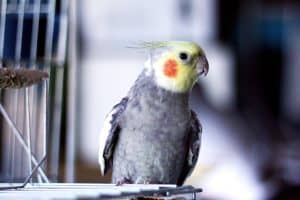
Interestingly, female cockatiels are often quieter than their male counterparts. Males are known to chatter more and sometimes let out a high-pitched sound, while females lean towards soft chirps and whistles. So, gender may be a factor if the noise level is a primary deciding element for your feathered friend choice.
While cockatiels may not have the power to mimic human speech like the African Grey, they do possess the ability to mimic sounds they frequently hear. Some examples could be microwave beeps, telephone rings, or even alarm clocks. So, watch out for what sounds your pet is exposed to!
Comparatively, these pet birds are quieter than many parrots but they’re not the most quiet bird out there. Species like the Senegal Parrot, Meyer’s Parrot, or Blue Headed Pionus are lauded as particularly quiet, which might be better options for noise-sensitive apartment dwellers.
But don’t forget, all birds are different, much like us humans. Some cockatiels may be more vocal than others, and often, this highlights their unique personalities. Additionally, birds tend to be louder when they’re bored or seeking attention, so providing plenty of toys and mental stimulation can help keep their noise levels down.
Furthermore, keep in mind the cage size needs of these small birds. Having a minimum cage size where cockatiels can spread their wings is crucial. This not only promotes their health but is also likely to keep them happier and hence, quieter.
Space Requirements: Do Cockatiels Need a Lot?
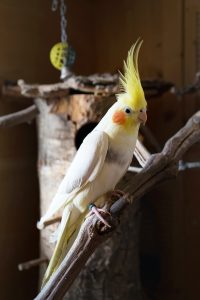
As far as space needs go, cockatiels are considered to be smaller birds, however, this doesn’t mean they don’t need sufficient space to stretch out and play.
A bird’s cage for a cockatiel should ideally be large enough for the bird to spread its wings fully without touching the sides. The minimum cage size recommended is 24x18x24 inches.
| Species | Minimum Cage Size |
| Cockatiels | 24x18x24 inches |
Moreover, the cage arrangement matters as well. Your feathered friend will require perches of different diameters, toys for mental stimulation, and housing essentials. But beware! Overcrowding the cage with too many items can limit the space for the bird to move around, leading to a stressed and unhappy pet.
You might have other pets in your apartment, so ensuring the cage is secure to prevent unwanted interactions is a must. Moreover, it’s more than just the cage. Out-of-cage time is critical for cockatiels. These playful birds require daily exercise and social interaction time out of their cage.
Unlike larger bird species such as Macaws or Senegal parrots, cockatiels manage quite well in smaller spaces. Yet, remember to ensure the space around the cage is safe, and free from things like open windows, other pets, or harmful houseplants.
While space might not be as big of an issue for cockatiels as some other birds, noise might be a factor for concern, especially in apartment living. Cockatiels can be relatively quiet compared to larger parrot species, but they still do make noise. They’re known for their cheerful whistles and, at times, an unexpected high-pitched sound.
Final Thoughts: Are Cockatiels Good for Apartments
In conclusion, cockatiels can be excellent pets for those living in apartments due to their small size, relative quietness, and lively personalities. They require a modest amount of space compared to larger birds, and with the right care and regular interaction, they can thrive in apartment living conditions. However, potential owners should be aware of the commitment involved in terms of care and the bird’s lifespan, which can extend up to 20 years. Each cockatiel has its own unique personality and requirements, which should also be taken into consideration before deciding to welcome one of these charming birds into your home.
Other suggested articles:
What to do if you need to take your cockatiel on a vacation?
